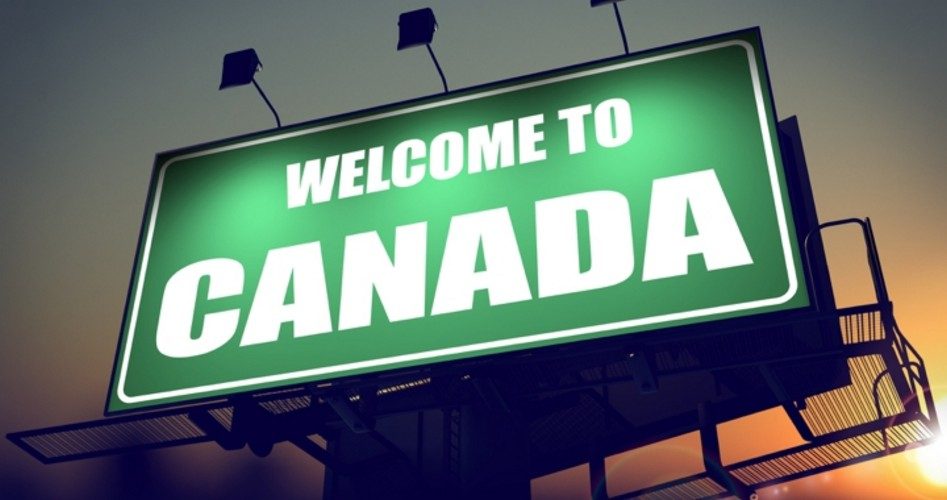
Illegal aliens who are apparently fearful about their future in the United States since President Trump signed Executive Order 13769 barring refugees and travelers from seven countries from entering the United States have been seen crossing the U.S. border into Canada recently. A Reuters news photographer filmed several people fleeing a U.S. border protection officer in New York State on February 17, as they crossed the border into the Canadian province of Quebec. Canada Border Services Agency reported that it found 22 people illegally crossing the border into the province of Manitoba that same weekend.
That order (formally titled “Protecting the Nation From Foreign Terrorist Entry Into the United States”) was temporarily blocked on February 3 by District Judge James Robart of the U.S. District Court for the Western District of Washington presiding in Washington v. Trump. That same day the Justice Department asked for an emergency stay to reverse Robart’s ruling. However, the U.S. Court of Appeals for the Ninth Circuit denied the administration’s immediate petition.
Despite that judicial hold, some illegal aliens who were worried about the eventual outcome have decided to go to Canada.
A February 17 report from VOA news described an incident in which U.S. Customs and Border Patrol officers questioned a man seated in a taxi that had pulled up to a gully at a popular border crossing point. Reporters had witnessed four other adults and four children cross the gully. VOA noted that a photograph revealed that at least one of the aliens had a passport from Sudan.
Another report in the International Business Times confirmed that the family claimed that they are Sudanese and had been living and working in Delaware for two years.
IBT reported that the man allegedly grabbed all his family’s passports, which had been seized by the U.S. officers, before making a run for it. The U.S. officer yelled and chased the man, who made it past the border marker and into the hands of the Canadian police. The report continued:
The [U.S.] border patrol police officer reportedly told his Canadian counterpart that he was in the process of detaining the man who was an undocumented immigrant in the United States. He then passed the luggage to the RCMP, which carried the articles, along with the people into their vehicles, so that they could be transported to a nearby border office for an interview.
Though not specifically mentioned in Trump’s executive order, Sudan is one of the “countries of concern” that Trump indirectly referred to by citing laws passed during the Obama administration:
I hereby proclaim that the immigrant and nonimmigrant entry into the United States of aliens from countries referred to in section 217(a)(12) of the INA [Immigration and Nationality Act], 8 U.S.C. 1187(a)(12), would be detrimental to the interests of the United States, and I hereby suspend entry into the United States, as immigrants and nonimmigrants, of such persons for 90 days from the date of this order (excluding those foreign nationals traveling on diplomatic visas, North Atlantic Treaty Organization visas, C-2 visas for travel to the United Nations, and G-1, G-2, G-3, and G-4 visas).
Trump’s reference to “countries referred to in section 217(a)(12) of the INA” refers to H.R. 158, the Visa Waiver Program Improvement and Terrorist Travel Prevention Act of 2015, which was signed into law by former President Obama on December 18, 2015, as part of the Omnibus Appropriations Act of FY2016. That legislation specifically mentioned Iraq, Syria, or any other country or area of concern. Two months later, the Obama administration added Libya, Somalia, and Yemen to the list, in what it called an effort to address “the growing threat from foreign terrorist fighters” Under the law, dual citizens of visa-waiver countries and Iran, Iraq, Sudan, or Syria could no longer travel to the United States without a visa.
A February 20 CNN report about the 22 aforementioned aliens who had crossed the border into Manitoba stated that the border crossers are being processed under Canadian law, according to a statement from the Canada Border Services Agency.
The report explained that the Safe Third Country Agreement between Canada and the United States requires people to apply for refugee protection in the first safe country they arrive in, which would include the United States. Since this provision disqualifies aliens who have spent time in the United States from having refugee status in Canada, such aliens have turned to sneaking across the border.
The VOA report explained how this technicality in Canadian law works:
People leaving the United States to seek asylum in Canada often cross the border illegally because of a technicality. If they have already applied for asylum in the United States, they cannot legally cross into Canada to apply for asylum there, because of an agreement between the two countries — they will be turned away at the U.S. border.
However, if they sneak across at an unofficial location, they may apply for asylum in Canada even if they are caught. They may spend a night or two in custody, but upon release, they are free to pursue their claims.
VOA also reported that the Royal Canadian Mounted Police (RCMP) said they have seen a noticeable increase in people crossing from the U.S. into Canada illegally since the Trump White House began tightening immigration restrictions earlier this year.
Related articles:
Trump’s Order Suspending Refugee Program: Racism or Balanced National Security?
Trump Executive Order to Ban Nationals of “Countries of Particular Concern”


